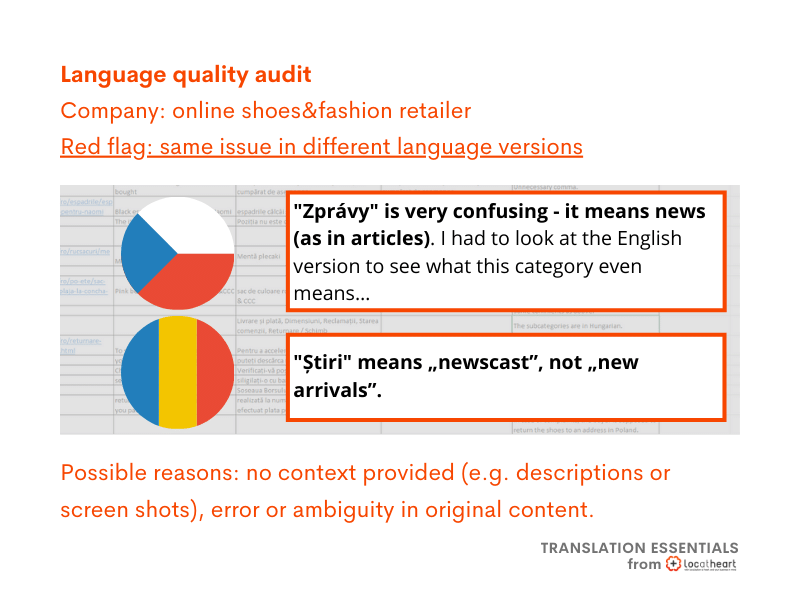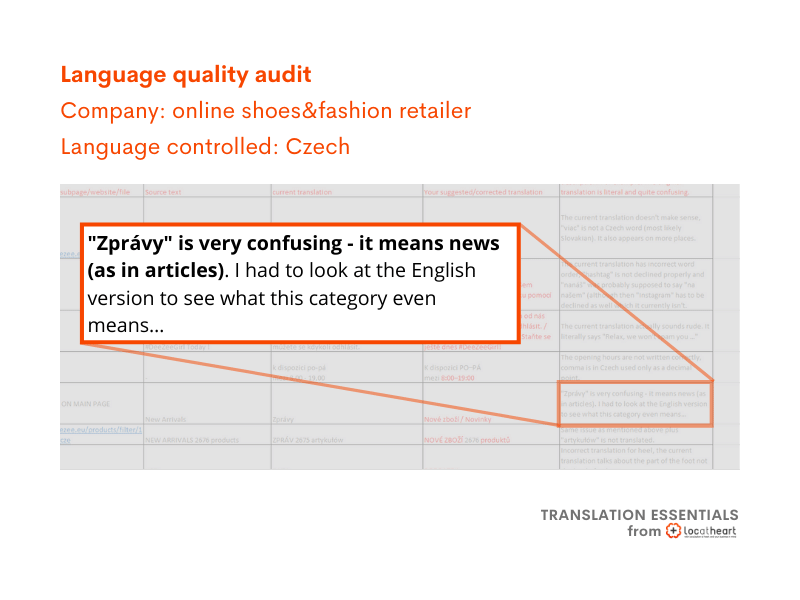HOW TO VERIFY TRANSLATION QUALITY (IN LANGUAGES YOU DON'T KNOW)
Here is an actionable list for you to use in the process:
- Don’t be fooled at the start
- Sign a deal
- Look out for symptoms
- Perform language quality audits
- Perform keyword audits
Don’t be fooled at the start
In Segment 3 you learnt what constitutes translation rates, and how the final cost of translation is shaped by repetitions and modern tools. In Segment 4, we described all of the tasks a translation agency performs other than translation. When looking for a translation agency, make sure you ask all the right questions about the tools they use (CAT software and automated QA solutions are a must), their process (project management, resource management), and the exact composition of the service and its possible levels of QA (as described in Translation Process Examples). Their answers will give you knowledge about how a company works and what quality can be expected for the price they offer.
There is a side benefit to asking all of these questions: your potential linguistic partner will notice you know what you are talking about, and they will have to treat you seriously.
Sign a deal
Many companies only operate based on e-mail orders and invoices, which seems nice and easy. But a contract can protect you. As each translation project is different and you do not want dozens of separate contracts, make your contract a framework that can be easily filled with specific orders for content translation. The one part of the contract that should be specific is the one regarding translation quality. Performance indicators should be mentioned as well as solutions allowing you to demand quality work – such as audits, standard deadlines for corrections or contractual penalties.
Look out for symptoms
There are several signs to look out for that can indicate poor translation quality:
- One market doesn’t convert
- There are many more customer service questions from one market
- There are more returns from one market
- Community building doesn’t work in one market
If one of these situations occurs, you shouldn’t just look at the tech or business and marketing side of things. All of these issues can be caused by translation problems such as:
- Ambiguous translations of product descriptions (those that fail to give an accurate account of the product and its benefits)
- Errors in translation (in terms of bad grammar, style and punctuation that make it seem like you don’t care about your customers)
- Errors in keyword and translation/identification (that make your products hard to find)
- Errors in tag and product description translation (that make your internal search and filtering options inefficient)
- Ambiguous customer service article translation (that fails to address customers’ needs)
These issues are relatively easy to fix and, most importantly, easy to find. You can do this with a language quality audit.
Perform language quality audits
A language quality audit is when an external language auditor (e.g. from another translation agency) verifies the translation by reading both the source and target text – or just the target if the source is unavailable. It is an additional review step, and a perfect solution if you want to check the quality of the translation service you have.
A skilled auditor can identify groups of problems (missing translations, errors in grammar/punctuation/style, using vocabulary from another industry etc.) that you can later improve and control.
Here are some real-life examples from audits performed by locatheart:
 Perform keyword audits
Perform keyword audits
Keyword translation is a hoax!
Keywords need to be identified for every new market, not simply translated – otherwise you’ll fall into one of the many pitfalls of online marketing. If you target your SEM campaigns and SEO efforts based on faulty keywords, your budget is wasted. Keyword audits can be performed with regular language quality audits, or they can be a separate service. It’s one that’s particularly handy if you have conversion and visibility issues.
Once you have your audit results, you can either discuss them with your language service provider and agree on the best solution of the problems or, if that doesn’t work, this can become the cause of contract termination and looking for another linguistic partner; but this all depends on your business relationship, track record and provisions of the contract.

